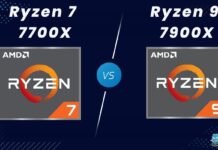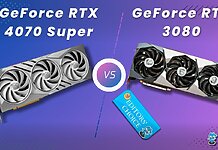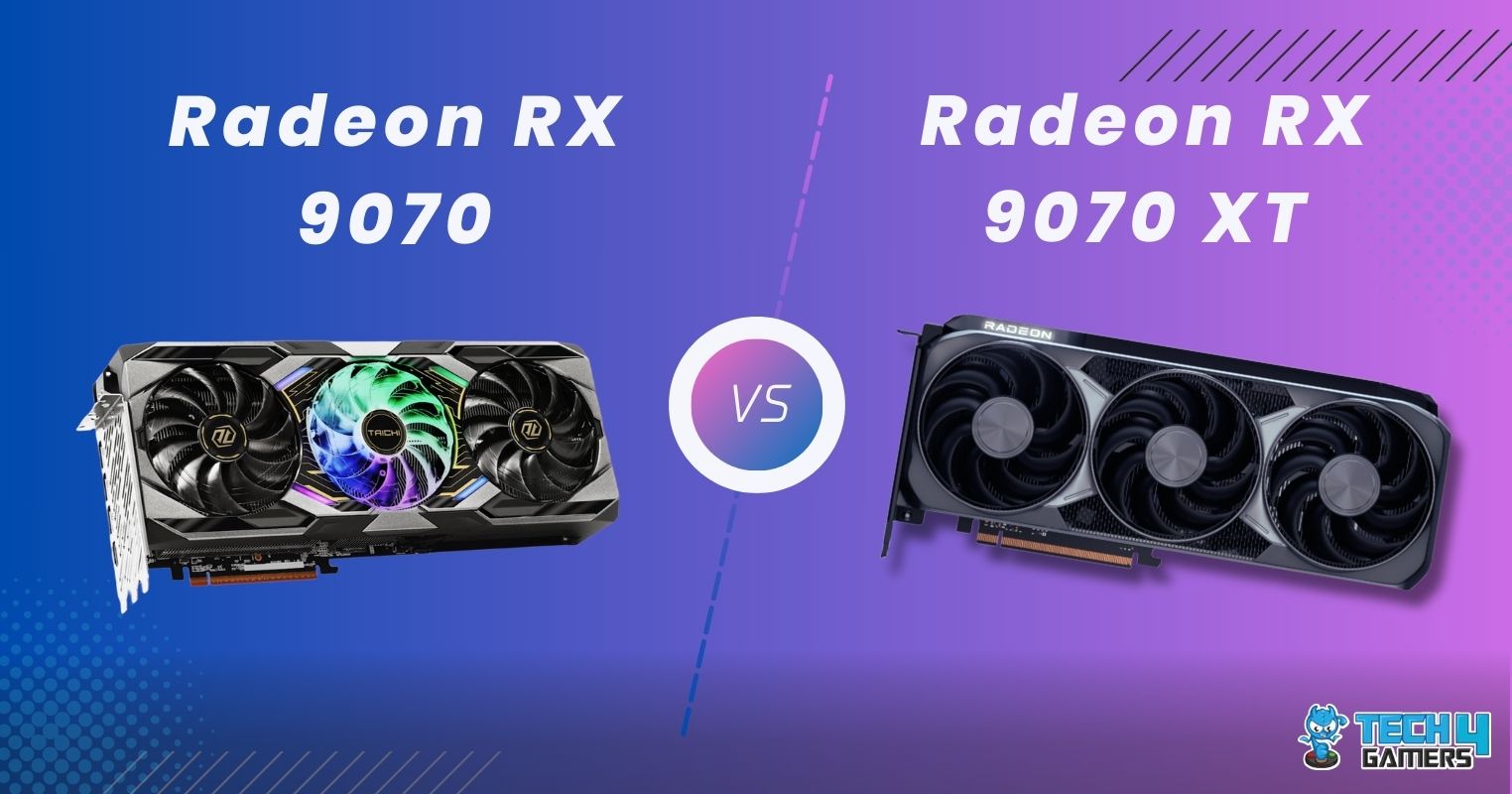Intel’s P series processors have been designed to deliver impressive performance while maintaining acceptable power efficiency. These processors have gotten significant attention and appeal among consumers for some time now. For many users, going for an older-generation product at a lower cost can be better than buying a slightly improved product. To help you determine if you fall into this category, we conducted comprehensive tests comparing the Core i7 1260P vs Core i7 1360P, the results of which you will see in the comparison below.
Key Takeaways
- Our comprehensive performance benchmarks revealed that the i7 1360P outperformed its predecessor by approximately 7%, showcasing an improvement in processing capabilities.
- Notably, both of these processors exhibited similar power consumption patterns during our rigorous testing, indicating a comparable energy efficiency between the i7 1360P and its older counterpart.
- It’s worth noting that due to its status as an older processor, the i7 1260P might be available at more budget-friendly prices, potentially providing a cost-effective option for those seeking solid performance on a tighter budget.
Comparison Table
| Model | Intel Core i7 1260P | Intel Core i7 1360P |
| Architecture | Intel Alder Lake-P | Intel Raptor Lake-P |
| Clock Speeds | 1500-4700MHz | 1600-5000MHz |
| L2 Cache | 10MB | 10MB |
| L3 Cache | 18MB | 18MB |
| Cores | 4 Performance 8 Efficiency |
4 Performance 8 Efficiency |
| Threads | 16 | 16 |
| Technology | 10nm | 10nm |
| Default TDP | 28W | 28W |
| max. Temp. | 100°C | 100°C |
| iGPU | Intel Iris G7 @1400MHz | Intel Iris G7 @1500MHz |
Architectural Differences
- Core Counts: Both the Core i7 1260P and 1360P have the same core configuration, comprising 4 Performance Cores and 8 Efficiency Core. As the efficiency cores on both processors are not hyperthreaded, these processors contain 16 threads. This is a monumental number compared to processors from even a few short years ago.
- Clock Speeds: The clock speeds of these two processors are the only noteworthy difference a typical consumer would see on a spec sheet. The i7 1260P has a base clock of 1500MHz, boosting up to a respectable 4700MHz. In contrast, the 1360P is clocked a hundred megahertz higher at the base at 1600MHz, and three hundred megahertz higher at boost with a frequency of 5000MHz.
- Lithography: Both of these processors utilize the 10nm manufacturing process from Intel, which is not as advanced as we’ve seen from the likes of AMD.
- Default TDP: As both these processors were made with performant ultrabooks in mind, these processors have a default TDP of 28 watts.
- L3 Cache: Furthermore, both the processors come with a respectable size of 18MB L3 Cache.
Core i7 1260P Vs Core i7 1360P: Performance Benchmarks
Now that we know the differences between these two rather similar processors, we will now take a look at their performance in various benchmarks. The results for these benchmarks are a median of several machines with these processors, so the scores on your computer might vary.
Cinebench R23
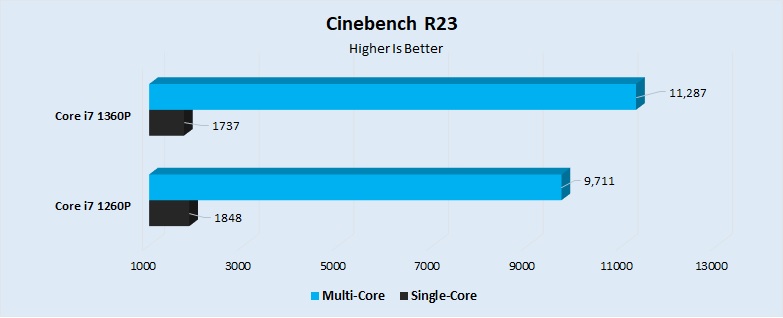
- Firing up Cinebench R23 on both of these processors, we see that the newer CPU has an unsurprising lead. It was 6% ahead of the 1260P in terms of single-core performance, scoring 1848 points, compared to 1737 points on the 1360P.
- Moving to multi-core only widened the gap. The 1260P got a score of 9711 points, whereas the 1360P got a whopping 11287 points. This came out to about a 16% difference in performance.
7-Zip
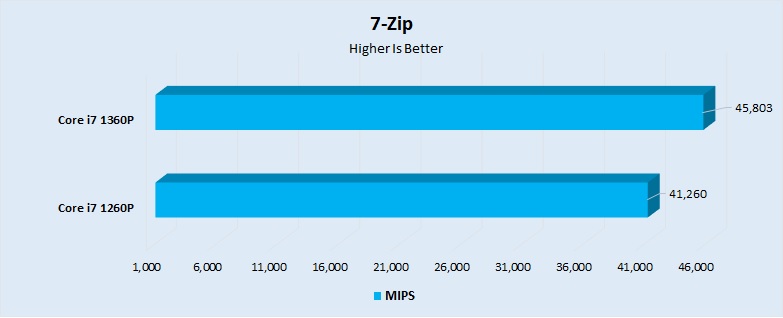
- Moving on to the 7-Zip decompression test, the 1360 outperformed its older brother by about 11%.
- The 1360P demolished this test with a performance of 45803 MIPS, whereas the 1260P got a performance of around 41260 MIPS.
HWBOT x265
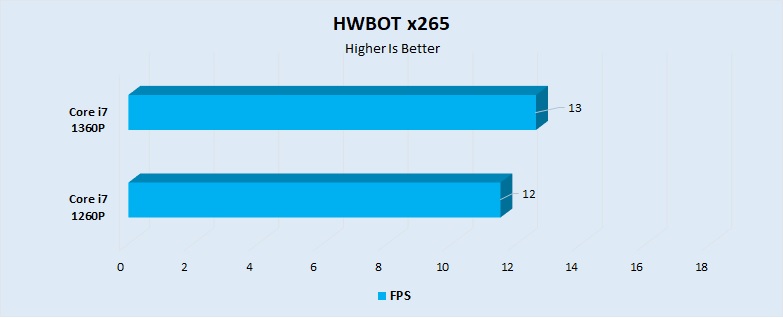
- The lead of the 1360P continued in the x256 HWBOT test at 4k. In this test, it was about 8.3% ahead of its rival.
- The 1360P got a framerate of around 13 FPS, taking a small lead over the 12 FPS from the 1260P.
Blender Classroom
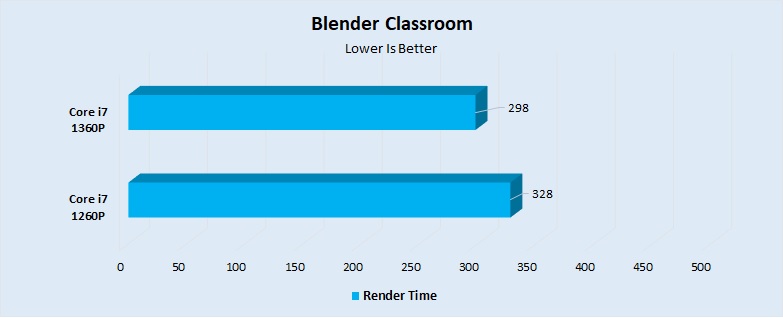
- In Blender’s Classroom render, the 1360P unsurprisingly beat the 1260P by a lead of about 9%.
- The i7 1260P had a render time of 328 seconds, whereas the 1360P only took 298 seconds to finish the same render.
3DMark 11
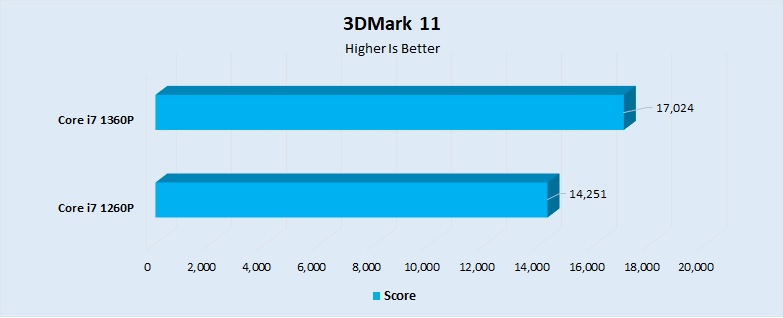
- The 3DMark 11 is a good test of a system’s performance in games, as the way this test utilizes the processor is similar to how games make use of a processor. The 13th gen i7 once again beat the 12th gen i7 by about 19%, affirming its strengths.
- The i7 1260P had a score of 14251 points in 3DMark 11, compared to the higher 17024 points that the 1360P scored for the same test.
Geekbench 6
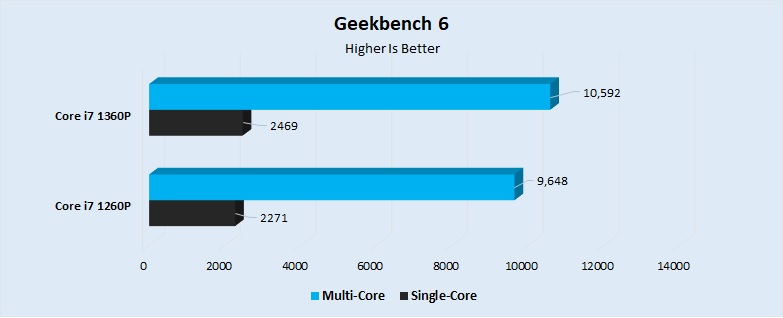
- In the new and extremely popular Geekbench 6 performance test, the 1360P continues its reign over the 1260P. It scored 9% better in the single-core test, with a score of around 2469 points, whereas the 1260P scored significantly lower at 2271 points.
- Moving on to the multi-core part of the test, the 1360P led by 10% over the 1260P, with a score of 10592 points versus the 1260P’s 9648.
Octane V2
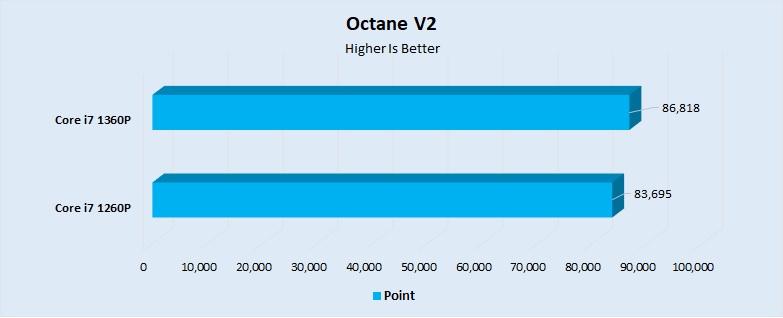
- The Octane V2 web test also showed the superiority of the 1360P, though not by a huge margin as we’ve seen in previous tests. Still, the 1360P maintained its lead with a 4% advantage.
- The i7 1260P had a score of 83695 points in this test, while the 1360P performed somewhat better with a score of 86818 points.
Power Consumption
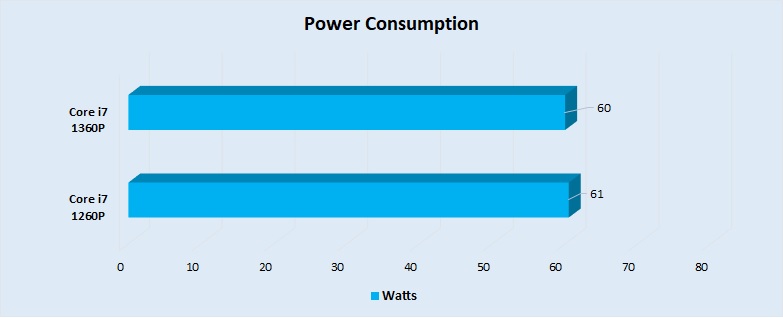
- Firing up our traditional power consumption measurement system, we see that both the processors perform about equivalently to each other.
- Using an external monitor to check the performance of these processors while putting stress on them using the Cinebench R15 benchmark, we saw that the 1260P took back 61 watts of power, whereas the 1360P was ever so slightly ahead with a drawback of 60 watts.
Our guide on extending laptop battery life comprises seven surefire ways to give new life to an old battery; read it if you need help improving the battery performance of your laptop.
Core i7 1360P Vs Core i7 1260P: Which One Should You Go For?
Now that we’ve put forth the slight differences in the performance of these two processors, in this part of the comparison, we will brief the type of consumer both chips suit.
- When deciding between the i7 1360P and the Core i7 1260P, it’s important to consider your priorities. If performance is your primary concern and you’re willing to invest in a higher-priced option, the i7 1360P stands out as a top-tier mobile processor.
- Conversely, the Core i7 1260P offers an attractive option for those who value a strong price-to-performance ratio. Its performance is commendable, especially considering its cost-effectiveness.
- Keep in mind that while the i7 1360P offers a slight performance advantage over the i7 1260P, the cost disparity should be considered. Assess whether the extra performance justifies the higher price based on your specific computing needs and budget considerations.
Pros And Cons
| CPU | Pros | Cons |
|---|---|---|
| Core i7 1260P |
|
|
| Core i7 1360P |
|
|
Frequently Asked Questions
The 1360P has a considerably higher frequency than the 1260P, whilst not consuming more power.
An ultrabook that utilizes the i7 1360P without breaking the bank is the Galaxy Book3.
The Lenovo Slim 7 14 is a great option to get a laptop configured with a 1260P because of its excellent screen.
Thank you! Please share your positive feedback. 🔋
How could we improve this post? Please Help us. 😔
[Comparisons Expert]
Abdemanaf is a skilled creative writer who has been honing his craft since 2011. While initially working in different fields, he found a passion for technology and has been exploring the tech world since early 2015. Over the years, he has developed an in-depth knowledge of the latest tech trends and product offerings by various companies.
Abdemanaf’s writing reflects his analytical mindset and ability to think critically. He has a knack for breaking down complex technical information into easily digestible pieces, making his articles engaging and accessible to readers from all backgrounds. In February 2022, he joined Tech4Gamers as a blog and product comparison writer, where he has been able to hone his skills further.
As a writer, Abdemanaf is dedicated to staying up-to-date with the latest technological advancements and trends, enabling him to provide readers with the most relevant and accurate information. He is always eager to learn more and is constantly seeking new challenges to improve his skills.
Get In Touch: manaf@tech4gamers.com


 Threads
Threads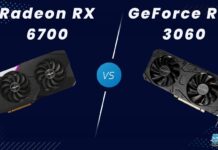
![RX 6600 XT Vs RTX 3050 [9 AAA Games Tested]](https://tech4gamers.com/wp-content/uploads/2023/02/Comparison-4-218x150.jpg)
